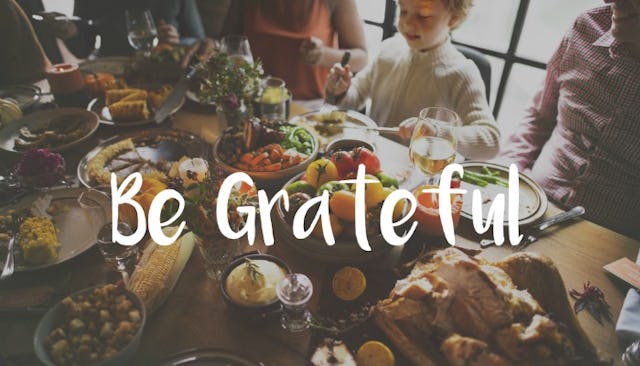You Don't Have To Bow To The Pressure To Be Grateful

It’s November — that time of year when the gratitude-industrial complex once again launches its campaign to educate us about the endless benefits of gratitude, and when everyone from NPR to Oprah urges us to be thankful for what we have.
And who has more to be thankful for than mothers? We are blessed with beautiful children, whose love and smiles fill our lives with joy and meaning. Some of us have worked super hard to get these children, putting ourselves through arduous fertility treatments or adoption processes. We don’t need Thanksgiving to remind us to feel over-the-top grateful. Look at all we have! Our lives should be a virtual cornucopia of gratitude. Right?
As a mom and a clinical psychologist who specializes in motherhood-related anxiety, I have a little trouble with the idea of gratitude. I’m not alone in this — a recent (and controversial) New York Times editorial discussed how gratitude can be self-serving and self-indulgent. I have a somewhat different problem with gratitude. While research shows that gratitude is associated with positive outcomes, such as happiness and life satisfaction, I’ve found that the opposite can also be true: Moms who are pressured to feel grateful can actually end up feeling worse about themselves and their situations.
Let me explain. I’ve worked with many moms who have a ton to be grateful for, and who are nonetheless very stressed, depressed, anxious, or all three. These women have shared that the relentless gratitude messages they receive during Thanksgiving are upsetting to them. They do recognize that they have so much, and yet they feel so unhappy. And this often leads them to feel even worse about themselves, wondering what kind of awful people they must be if they can’t just be happy with all they have.
I’ve also worked with moms who struggle to find things to be grateful for. Of course, the gratitude-industrial complex has an answer for that. I recently saw something on a mindfulness-related Twitter feed reminding people to be thankful for clean air and water and a warm home. We should all no doubt be thankful for these things, as they are critical to sustaining life. However, they provide little consolation to someone who is lonely and depressed.
In my experience, the mandate to feel grateful can be experienced by some as invalidating, the equivalent of someone saying to them, “You have [food/clean water/a great family/etc.], so quit your whining and buck up!” But of course depression, stress, and anxiety don’t work that way. If there’s anything we’ve learned from high-profile suicides like Robin Williams’, it’s that having a ton to be grateful for (money, family, career success) does not protect anyone from mental illness.
One of the things we talk about in cognitive-behavioral therapy is the need for people to accept their negative emotions and show compassion towards themselves. So what I try to do during the gratitude season is let moms know that they can feel grateful and still feel sad, or that they might not feel grateful, despite having First World comforts, and that this is okay, too.
I guess what I’m saying is that I’m okay with Oprah and everyone else talking about gratitude. But I think all of those articles and posts and tweets about the importance of practicing gratitude should also come with footnotes like these:
It’s okay if you try to think of something to be grateful for but can’t.
It’s okay if you are grateful for some aspects of your life but not others.
It’s okay if you have everything in the world to be grateful for and still don’t feel happy.
Now that’s a Thanksgiving message that I can get behind.
[free_ebook]
This article was originally published on